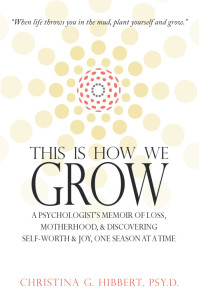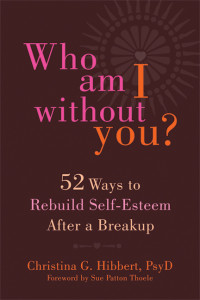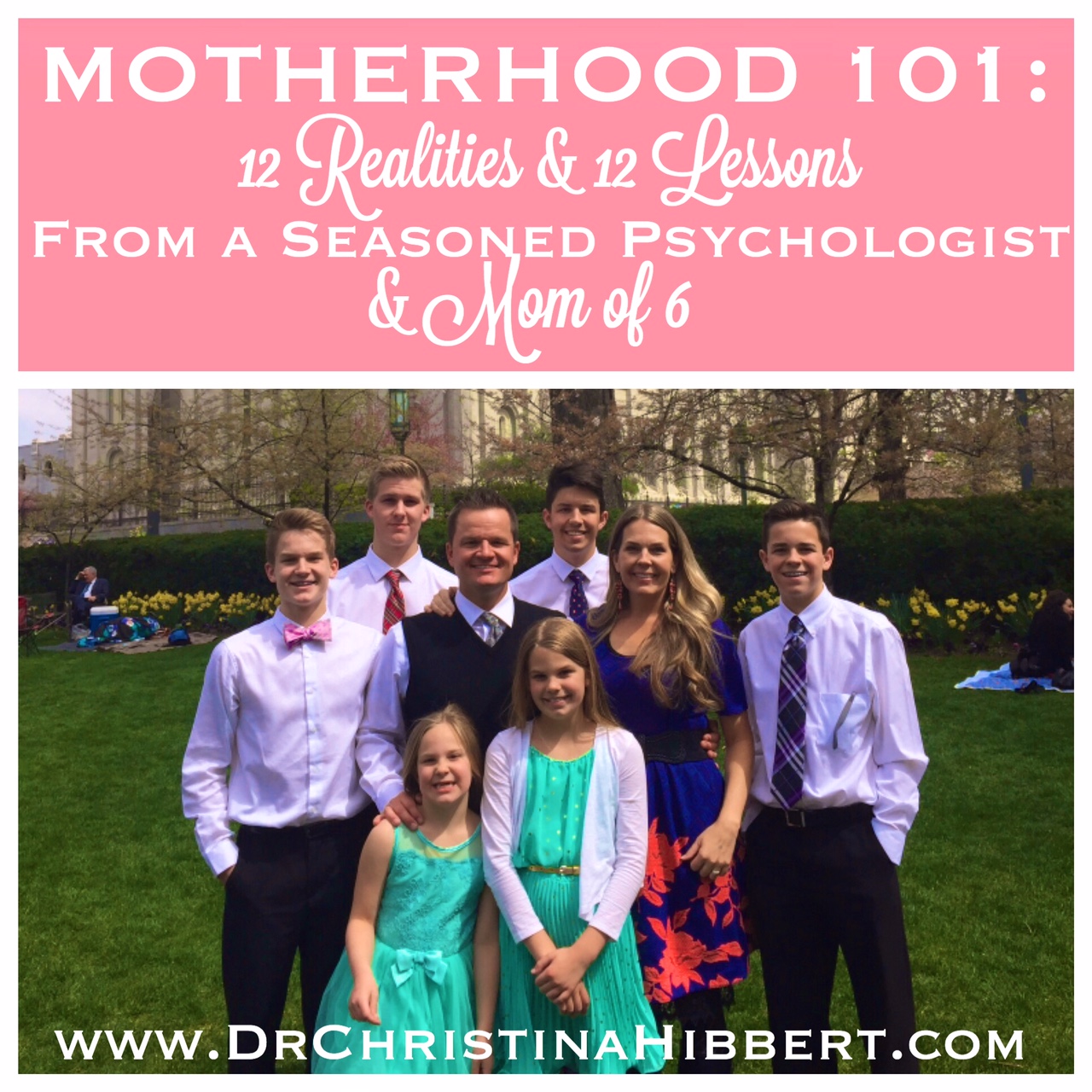
07 May Motherhood 101: 12 Realities & 12 Lessons from a Seasoned Psychologist & Mom of 6 (PSI Blog Hop 2015)
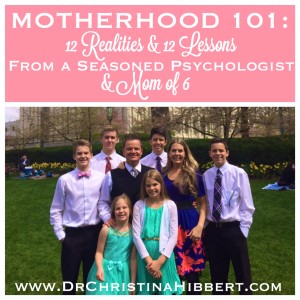 It’s that time of year again–May, or as my friends and I call it, “May-hem!” The end of the school year, commitments galore, graduations, the summer-shift approaching, and all month long, what do we celebrate? Motherhood. How fitting! Between mother’s day, Maternal Mental Health Awareness Month (May) & day (May 7th), I’m in the mood to speak a little truth about good old motherhood!
It’s that time of year again–May, or as my friends and I call it, “May-hem!” The end of the school year, commitments galore, graduations, the summer-shift approaching, and all month long, what do we celebrate? Motherhood. How fitting! Between mother’s day, Maternal Mental Health Awareness Month (May) & day (May 7th), I’m in the mood to speak a little truth about good old motherhood!
I’ve been at it for over 18 years, and with six kids, now ages 7, 11, 14, 16, 18, and 18 1/2, well let’s just say, I know the reality and I’ve learned a few lessons. As a psychologist, I’ve learned some important lessons, too–the first being that we need to talk about the realities of motherhood, and that we need to open ourselves up to the lessons motherhood has to offer.
So, hold on tight and grab a notebook! It’s time for “Motherhood 101.”
(And be sure to join me for my new radio show, “Motherhood!” Starting May 18th on WebTalkRadio.net! And don’t miss my exclusive offer–FREE Postpartum Couples DVD!)
MOTHERHOOD 101
Reality #1: It’s hard!
No matter what “season of motherhood” you’re in, it’s the hardest work in the world. It’s a 24/7, 365-day job, and a highly demanding one at that. Up early, no sleep, go-go-go all day long, keep going all night too, worrying yourself awake in the
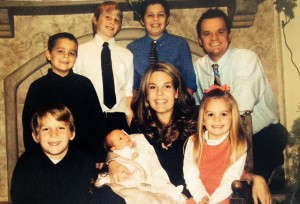
Just weeks after our family went from three to six kids! Talk about motherhood being hard! Some days, I didn’t think I could do it. (Read about it in “This is How We Grow.”)
early hours, exhausting yourself, giving your all. But we do it because we love our children, right? As I wrote in a song about motherhood a few years ago, “It’s the hardest work I’ve ever done, but somehow, it’s the easiest to do.”
When I ran a postpartum support group a few years ago, the moms struggling with postpartum depression and anxiety would desperately ask, “It gets easier, doesn’t it?” To which, I’d reply, “Yes… And then, it doesn’t. And then, it does…” We are happy to leave behind the sleepless nights of having an infant only to find our house is destroyed by an energetic toddler. We finally leave behind “the terrible twos” only to find the “threes” might be even more terrible as they develop greater independence. Not to mention the teen years! (I have 4 teenaged sons right now! Aye-yi-yi!). But, it’s all worth it. They grow, and hopefully, so do we.
Lesson #1: Recognize that it’s hard.
Even if it looks easy on TV or on a friend’s Facebook page, trust me, it’s not. You’re not alone in this crazy thing called motherhood–it’s hard for all of us, and some times are harder than others. Discover which phases and seasons of mothering are easiest and most rewarding for you and which are not, and then, give yourself a break in the harder times and recognize your strengths and put them to good use in the easier times. Oh, and hang in there! It does get easier. And then it doesn’t…
Reality #2: Hormones, brain chemistry, and life experiences can make it even harder.
Women’s mental health is made up of a unique blend of our hormones, brain chemistry, and life experiences. Monthly hormonal shifts, pregnancy,
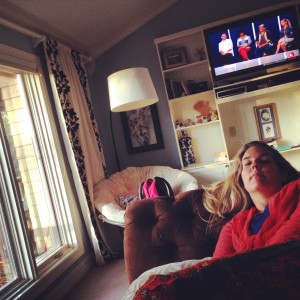
Me, during my most recent hormonal quarantine, watching Project Runway and eating chocolate with the door bolted shut! Thank you, hormones!
postpartum, and perimenoupause can all significantly affect our coping abilities. Hormones also directly impact the neurotransmitters that make our brain feel well, and life experiences do the same. Trauma and loss change our brain chemistry and, over time, can leave us feeling depressed, anxious, or worse.
Lesson #2: Understand all you can about your emotional health and take care of yourself.
Learn about Women’s Emotional Health and what it means for you. Then, take care of your body and brain through good nutrition, sleep, exercise, regular health exams, emotional processing and support, and spiritual self-care.
Reality #3: You won’t love every moment, and you won’t feel happy all the time.
As I wrote in This is How We Grow, “I love every moment of being a mother. I even love the moments I don’t love.” Yes, if there’s one thing we can count on, it’s that we won’t love every moment. But, joy in motherhood is found in the small moments, and joyful moments are everywhere in motherhood, if you’ll open your heart and seek them out.
Lesson #3: Look for joy in the moments.
Happiness in motherhood is found in the small moments—in the laugh, the love, the play, the hug. As we seek out these moments we see them more clearly, we’re more present, and we soak them up. As we connect these moments we find that motherhood really is joy-filled, or it can be if we look for the joy in the moments.
Reality #4: During some seasons of motherhood, it may a struggle to feel happy at all.
Pregnancy or postpartum depression, anxiety, OCD, and psychosis together affect one in five moms and can make it rough to feel happiness or joy; it can also crush your sense of self-worth. Maternal depression is also common and can last for years if untreated.
Lesson #4: It’s not “normal” or “okay” to live with depression, anxiety, or even with no self-worth, and it’s definitely not good for our families either, so SEEK HELP.
With help, you can and will be well, which is not only good for you; it’s good for your children, spouse/partner, and family, too. And if you keep working, you can be even “better than better!” Acknowledge your needs and seek help. Then, let that help in. There are fabulous support groups, counselors, doctors, and resources for pregnancy, postpartum, and beyond. Postpartum Support International is a wonderful resource, with support coordinators in every state and around the world. Your church or faith community, friends, and family are another good place to start for help, support, and referrals.
Reality #5: We can’t do motherhood alone.
We need each other in motherhood more than perhaps any other time. Support is crucial in motherhood—support for us, support for our children, support for our husbands/partners—we cannot survive without it. We may feel like we don’t know where to turn, or like

My family with my friend’s family, sending balloons to her in heaven to remember her one year death anniversary. We need each other.
we don’t have anyone to rely upon, but we must prioritize building our support system.
Lesson #5: Build your support system.
Make a list of everyone who supports you and what they can do. Include your family, including family, friends, faith/community members/resources, support groups, online support, professional support like counselors, doctors, etc. One person might be great at helping with childcare, while another is the one you can talk to when times are tough. If you feel your support system is lacking, then start building a better one. It takes time, but support is out there if you’re patient and willing to work.
Reality #6: Loss is a big part of motherhood.
Whether struggles with postpartum depression or anxiety, relationship changes and challenges, wayward children, death, job/career loss, or sending them off to preschool, kindergarten, college, or beyond, motherhood carries with it a lot of loss. These losses, if not dealt with, can build up and create more trouble for our emotional and physical health over time.
Lesson #6: Recognize your losses, then grieve them.
Reality #7: Motherhood is not just a “job”; it’s a calling.
I’ve long reminded myself that though I don’t really love the “job” of mothering—the late nights, early mornings,

Motherhood isn’t just a “job;” it’s a calling. My forever family, April 2015.
cooking, cleaning, diaper-changing, problem-solving constant-ness of it all—I do love being a mother. Motherhood is a high and holy calling: I believe that, 100%, though it doesn’t always feel that way. It’s a forever kind of deal, so it’s important to work it out, to believe in that calling, to find our gratitude for our role as a mother.
Lesson #7: Motherhood really isn’t about the “job” at all; it’s about love.
The house, dinner, bathtime—that can all come or go. What matters is how we love. What matters is how we value our role as a mother. Do we recognize the gift it truly is? Do we remind ourselves in the hardest times how grateful we really are to be called, “Mom?”
Reality #8: Motherhood isn’t about how our kids turn out.
So many moms I know focus on the choices their kids make as a measure of how well they’re doing as moms. I’ve been there before, too, and trust me, it’s not pleasant! The truth is, we have no real control over our children’s lives when they get to a certain point. That’s not the way it works, and really it’s what we’re striving for as we parent them over the year—independence and self-reliance.
Lesson #8: The “fruit” of motherhood is how we turn out. It’s about how motherhood changes us. It’s about how motherhood transforms us.
Reality #9: It really does fly by.
As I was dropping my oldest son off at college last fall, I hugged him, got in the car and forced myself to drive away, watching him excitedly return to his dorm in my review mirror. All I could think was, “They were right. It really does fly by. We have them for such a short time and then, they’re gone.” I bawled the entire four hour drive home! When I called my husband, he thought I was crazy, and to be truthful, so did I. But it really hit me—it goes so, so fast.
Lesson #9: Pay attention and be grateful now.
Years ago, when I’d have those stressed-out, frustrated, overwhelmed, exhausted mothering days (and there have been plenty!), my older friends who were missing their little ones would say, “Enjoy it while you can; it goes so fast.” I knew they were right, but I couldn’t feel it in those moments when I just wanted to get through the day and crash to sleep. Then one day, I really did get it. I decided I didn’t want to miss those precious years when they were young because I was stressed, overwhelmed, frustrated, or tired. And so, I made a goal to stop and stand still in the chaos. I’d briefly close my eyes and imagine my kids grown and gone and my house quiet and still. Though a luxury in the busy mothering days, I’d let myself feel how a quiet house may feel lonely when it’s permanent. I’d say a little prayer, ask for help to be grateful for this very moment, and take a snapshot of it. Then, I’d breathe deeply, smile or sometimes even chuckle to myself and just say it like it is, “Motherhood is a crazy ride!” And back to business. Truthfully, years later, the chaotic moments are some of the most memorable.
Reality #10: We mothers need to be a little (or a lot) kinder, more compassionate, more forgiving, and more loving toward ourselves.
We’re harder on ourselves than any other group on the planet! It’s such a shame, because I’m convinced no one works or loves harder than mothers.
Lesson #10: Practice self-love.
Self-love involves: 1) Self-care—take care of your physical, emotional, mental/intellectual, social and spiritual needs. It’s not selfish 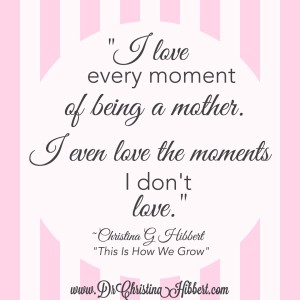 to practice self-care. In fact, it’s the only real way to be healthy and strong as a mom, and it teaches your kids to do the same. 2) Self-compassion—forgive yourself, accept your weaknesses, be gentle when you make a mistake. 3) Self-kindness—do nice things for yourself. Time alone or with friends, a bath, a nap, a walk, a “girls’ night”—whatever feeds your soul, do that. 4) Let others love you. Let your children’s love in. Let your husband’s/partner’s love in. Let your support system’s love in. Let God’s love in. Open your heart and let it receive love. Then, give and open again and again and again. (more on Self-Love here or in my new book, Who Am I Without You?)
to practice self-care. In fact, it’s the only real way to be healthy and strong as a mom, and it teaches your kids to do the same. 2) Self-compassion—forgive yourself, accept your weaknesses, be gentle when you make a mistake. 3) Self-kindness—do nice things for yourself. Time alone or with friends, a bath, a nap, a walk, a “girls’ night”—whatever feeds your soul, do that. 4) Let others love you. Let your children’s love in. Let your husband’s/partner’s love in. Let your support system’s love in. Let God’s love in. Open your heart and let it receive love. Then, give and open again and again and again. (more on Self-Love here or in my new book, Who Am I Without You?)
Reality #11: At its core, motherhood is really about love.
That’s what it’s really all about–growing in love. Receiving love. Giving great love. Motherhood is truly all about a beautiful cycle of giving and receiving love.
Lesson #11: Love greatly.
When hard times hit, love. When great times are rolling, love. When you’re fearful, worried, overwhelmed, at your limit, love greatly. It is love that overcomes the pain and stress of motherhood. It’s really all about love. Again, love greatly.
Reality #12: Motherhood is a crazy ride.
Trust me, I know! In fact, if you google, “My Kids are Driving Me Crazy,” my blog posts come up on page 1, so it’s really no secret. But oh how exhilarating! It’s the up, and down, and spinning around, upside-down ride of your life! And it doesn’t end there. Motherhood is forever. So, learn your lessons, buckle up, and hold tight!
Lesson #12: Enjoy it while it’s here.
Don’t take motherhood for granted. Don’t wish away your moments or your days. Identify your challenges. Seek help. Let help in. Choose to grow through motherhood. Then, sit back, buckle up, take a deep breath, and enjoy the ride. It’s the greatest ride of your life!
What are some of your motherhood “realities” and “lessons?”
Leave a comment, below, and join the conversation!
An Invitation to YOU!
Join us for
Postpartum Support International’s 2015
Third Maternal Mental Health Awareness Month
Blog Hop!
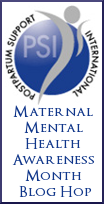
2015 Theme:
You Are Not Alone: Focus on Support Groups and Resources
Read this post for rules, and then link up there or below!
And be sure to check out the other incredible posts linked up, below!
Link Up Here!
Check out my NEW, Exciting, Exclusive Offer:
FREE Postpartum Couples DVD!
Click here for information and Instant Access!
Tune in to my BRAND NEW Radio Show,
MOTHERHOOD!
Starting May 18th on WebTalkRadio.net!
Oh, and be sure to tell your friends, and your mom!
Be sure to check out Dr. Hibbert’s Amazon Bestseller, This is How We Grow–
available now on Amazon.com!
Available now at Target, Amazon, Barnes & Noble, New Harbinger, or your local bookseller!
“Who Am I Without You is the light at the end of the tunnel!”
“So much more than a breakup book, this is a guide to self-worth for anyone, all in a neat little 52-lesson package!”
You may manage your subscription options from your profile.
Don’t miss a thing!
SUBSCRIBE, above, “like” my Facebook pages (Dr. Christina Hibbert; This Is How We Grow), and follow me on Twitter,Pinterest, & Instagram!
Related Posts/Articles:
16 Things I’d Like My Postpartum Self to Know, 16 Years & 6 Kids Later (PSI Blog Hop 2013)
Moving Beyond Shame: The Ultimate Power of Support & Time (PSI Blog Hop)
Beyond Depression: Understanding Pregnancy/Postpartum OCD (Part 1)
Pregnancy & Postpartum Emotional Health
Postpartum Depression Treatment
Postpartum Depression Treatment: For Dads & Partners
Postpartum Depression Treatment: For Couples
Postpartum Depression Treatment: Sleep
Postpartum Depression & Men: The Facts on Paternal Postnatal Depression
Mom Mental Health (& Happiness): The Importance of Alone Time
Pregnancy & Postpartum Mood & Anxiety Disorders: Are Women of Advanced Maternal Age at Higher Risk?
In Praise of Fathers: 10 Research-Based Ways Dads Impact Kids for the Better
5 Reasons Self-Esteem is a Myth
Womens’ Emotions & Hormones– Series
Achieving Balance–Why You’ve Got it Wrong, & How to Get it Right
Pregnancy & Postpartum Loss, Grief, & Family Healing (Part 1)

